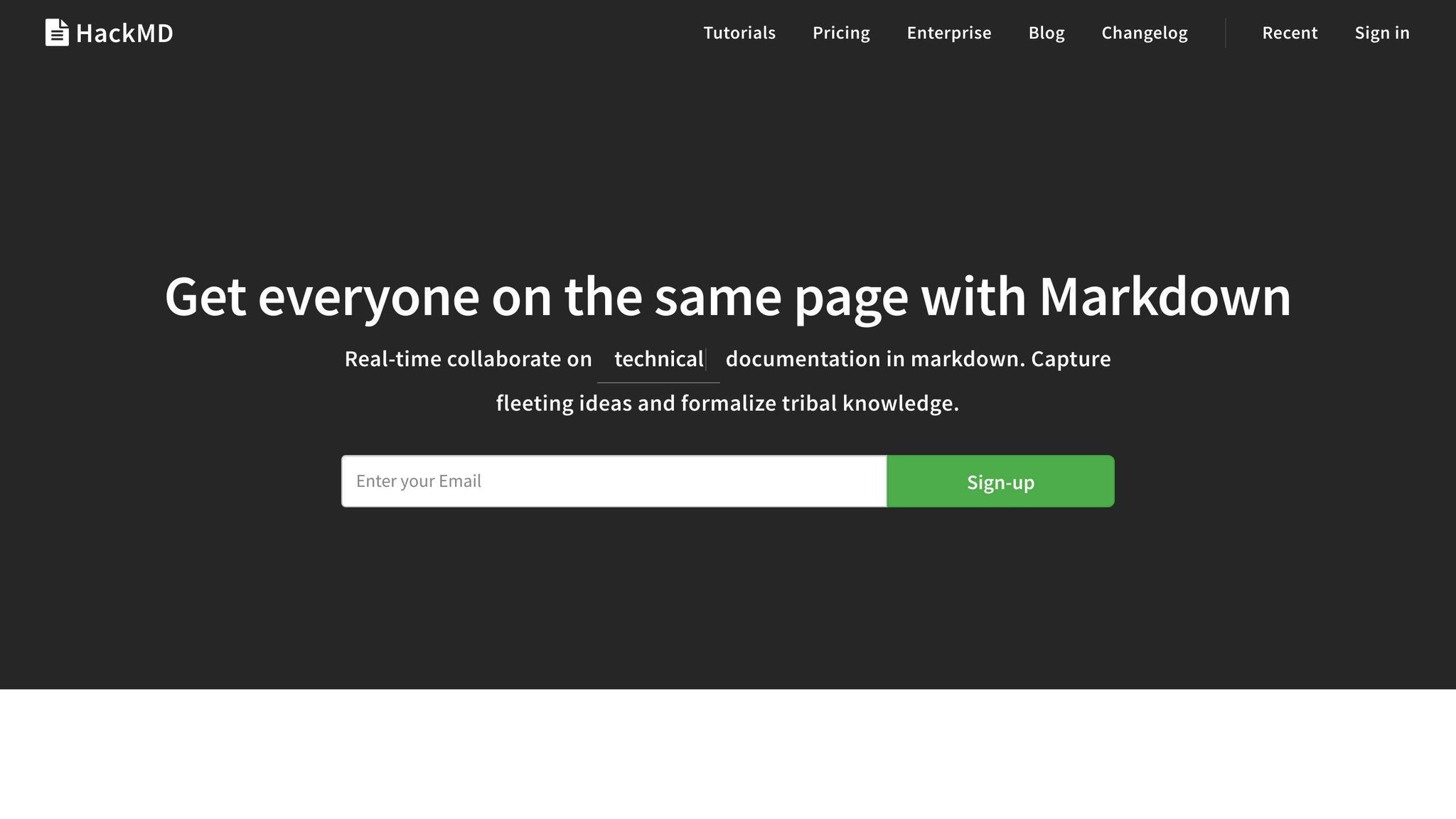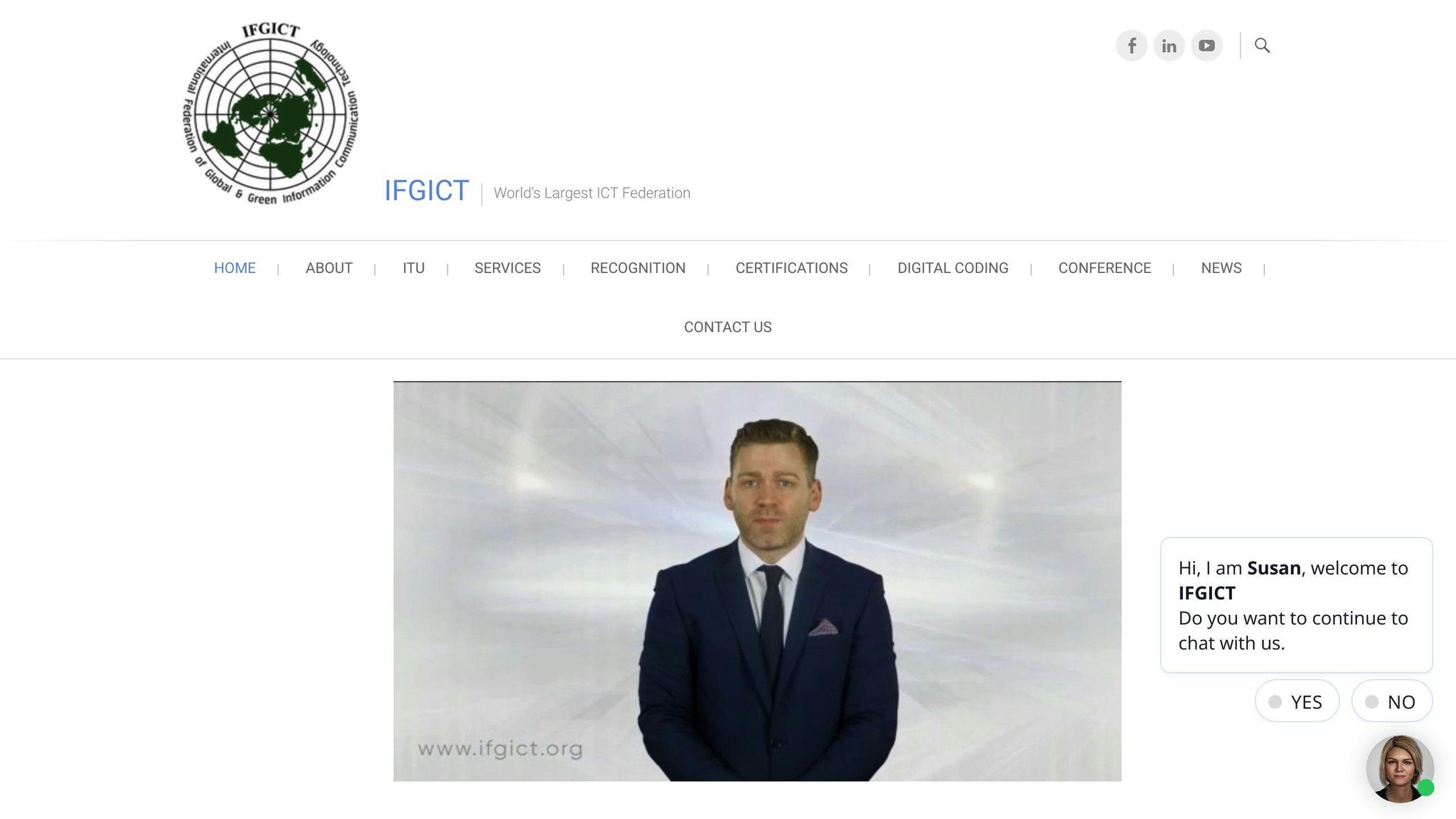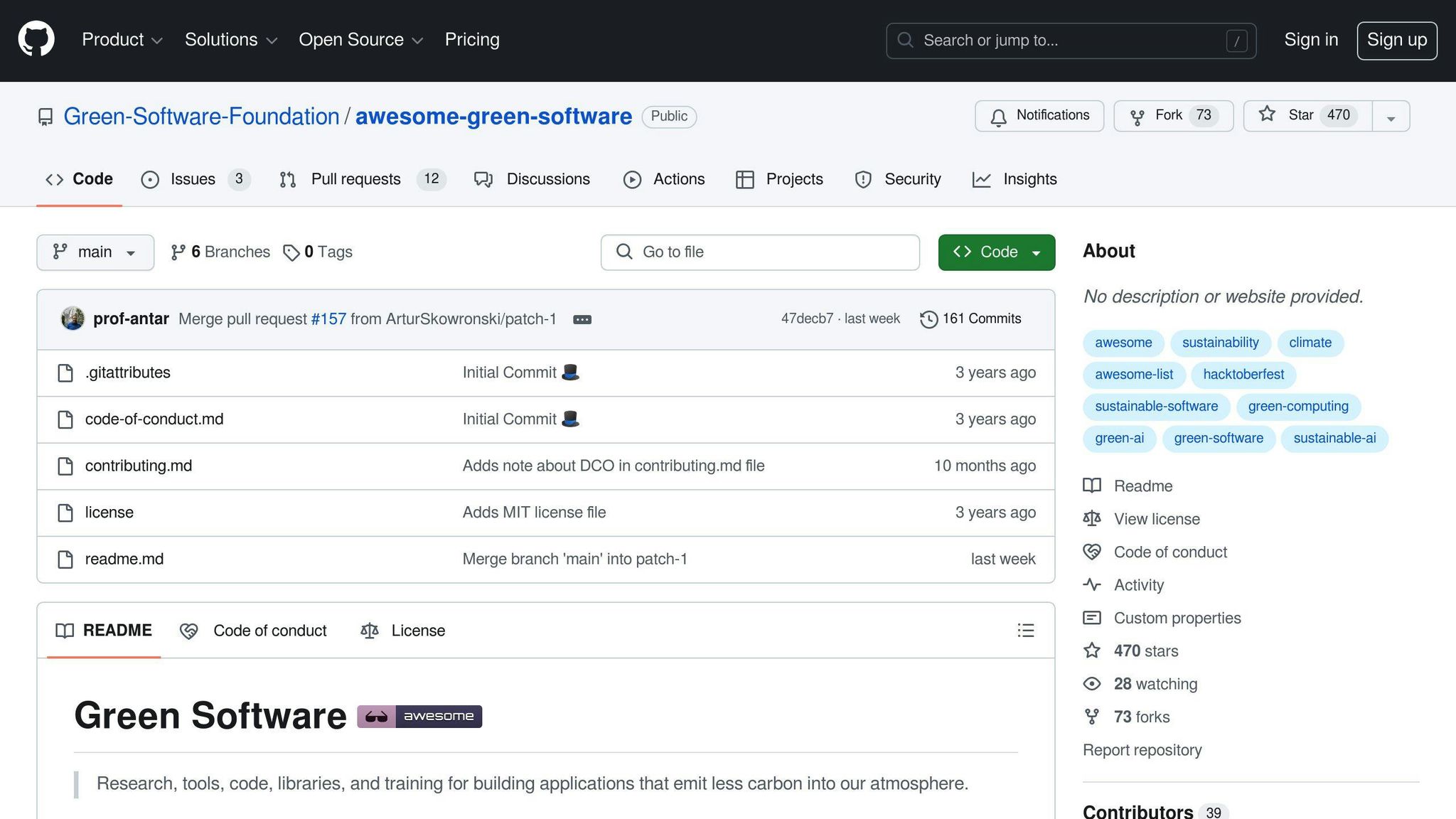


Explore the top 10 training resources for green software development to create eco-friendly IT solutions and reduce environmental impact.
Green software development is a sustainable approach to creating software that reduces environmental impact. By learning these practices, developers can contribute to a more eco-friendly IT sector by:
- Creating energy-efficient systems
- Optimizing resource usage
- Reducing greenhouse gas emissions
- Lowering a company's carbon footprint
This article presents the top 10 training resources for learning green software development principles and techniques:
- Green Software for Practitioners (LFC131) - Comprehensive Linux Foundation course with certification
- Learn Green Software - Program teaching energy-efficient software creation
- Green IT Certificate - Green Software Design - Certification focused on sustainable software applications
- Workshops & Trainings | green-coding.io - Hands-on workshops on sustainable coding practices
- 10 Recommendations for Green Software Development | GSF - Practical guide from the Green Software Foundation
- Sustainable Software Development: 9 Eco-friendly Coding Practices - Key practices for environmentally-friendly coding
- Green Software learning resources - HackMD - Platform with tutorials and guides on green software
- Green IT Professional GITP - IFGICT - Certification program on green ICT standards and practices
- awesome-green-software - GitHub - Open-source tools and resources for reducing carbon emissions
- Principles of Sustainable Software Engineering - Training - Program based on research for the German 'Blue Angel' label
| Resource | Certification | Focus |
|---|---|---|
| Green Software for Practitioners | Linux Foundation | Energy efficiency, sustainable design |
| Learn Green Software | Yes | Energy-efficient systems, eco-friendly coding |
| Green IT Certificate | Yes | Sustainable software applications |
| green-coding.io | No | Sustainable coding practices |
| GSF Recommendations | No | Practical sustainability guidance |
| 9 Eco-friendly Practices | No | Environmentally-friendly coding techniques |
| HackMD Resources | No | Tutorials and guides on green software |
| Green IT Professional GITP | IFGICT | Green ICT standards and environmental management |
| awesome-green-software | No | Open-source tools for reducing emissions |
| Sustainable Software Engineering | Aligned with German 'Blue Angel' label | Sustainable software design principles |
By leveraging these top training resources, developers can gain the knowledge and skills needed to create more sustainable and environmentally-responsible software solutions.
Related video from YouTube
Choosing Green Software Training
When looking for green software development training resources, consider the following key factors:
Evaluation Criteria
| Criteria | Description |
|---|---|
| Scope of training | Comprehensive overview or specific aspects (e.g., energy-efficient systems) |
| Certification | Formal recognition or certification offered |
| Practical application | Tools and techniques covered |
| Educator expertise | Experience and knowledge of instructors |
| Industry relevance | Updates and relevance to current industry landscape |
To make an informed decision, evaluate training resources based on these factors. Some courses may offer a broad introduction to sustainable software engineering, while others may focus on specific areas, such as reducing greenhouse gas emissions.
Popular Training Resources
Some popular training resources to consider include:
- Sustainable Software Engineering Overview course by Asim Hussain
- Green Software Practitioner course by the Green Software Foundation
- Sustainable Software Development course by the Linux Foundation
These resources offer a range of training options, from introductory courses to advanced certifications, and are taught by experienced professionals in the field.
By considering these factors and exploring popular training resources, you can find the right fit for your green software development training needs.
1. Green Software for Practitioners (LFC131)
Course Overview
The Green Software for Practitioners (LFC131) course, offered by the Linux Foundation, provides a comprehensive introduction to sustainable software development practices. This course covers the fundamental concepts and principles of green software development.
Certification
Upon completing the course, participants receive a certification from the Linux Foundation, recognizing their knowledge and skills in green software development.
Course Content
The course focuses on practical application, providing participants with hands-on experience in using tools and techniques to develop sustainable software. The course covers:
- Energy-efficient systems
- Sustainable coding practices
- Environmentally responsible software design
- Analyzing and optimizing software systems for energy efficiency
- Reducing greenhouse gas emissions
Instructor Expertise
The course is taught by experienced professionals in the field of sustainable software development, ensuring that participants receive expert guidance and mentorship throughout the training.
Industry Relevance
The course is regularly updated to reflect the latest industry trends, best practices, and emerging technologies in sustainable software development. This ensures that participants receive relevant and timely training that prepares them for the challenges and opportunities in the field.
2. Learn Green Software
Course Overview
Learn Green Software is a comprehensive training program that teaches developers how to create energy-efficient software with minimal environmental impact.
Certification
Upon completion, participants receive a certification recognizing their expertise in green software development.
Course Content
The program covers:
| Topic | Description |
|---|---|
| Energy-Efficient Systems | Designing systems that use minimal energy |
| Sustainable Coding Practices | Writing code that reduces environmental impact |
| Environmentally Responsible Software Design | Creating software that is eco-friendly |
| Analyzing and Optimizing Software Systems | Identifying areas for energy efficiency improvement |
Instructor Expertise
The program is taught by experienced professionals in sustainable software development, providing guidance and mentorship throughout the training.
Industry Relevance
The program is regularly updated to reflect the latest industry trends, best practices, and emerging technologies in sustainable software development, ensuring participants receive relevant and timely training.
3. Green IT Certificate - Green Software Design
Scope of Training
The Green IT Certificate - Green Software Design is a comprehensive training program that focuses on creating sustainable software applications with minimal environmental impact. This certification program covers the principles of green software design, energy-efficient systems, and environmentally responsible software development.
Certification
Upon completion of the program, participants receive a recognized certification in green software design, demonstrating their expertise in creating sustainable software solutions.
Practical Application and Tools
The program provides hands-on training in designing and developing green software applications, using tools and techniques that reduce energy consumption and environmental impact. Participants learn how to:
| Topic | Description |
|---|---|
| Energy-Efficient Systems | Designing systems that use minimal energy |
| Sustainable Coding Practices | Writing code that reduces environmental impact |
| Environmentally Responsible Software Design | Creating software that is eco-friendly |
| Analyzing and Optimizing Software Systems | Identifying areas for energy efficiency improvement |
Expertise of Educators
The program is taught by experienced professionals in sustainable software development, providing guidance and mentorship throughout the training.
Industry Relevance and Updates
The program is regularly updated to reflect the latest industry trends and emerging technologies in sustainable software development, ensuring participants receive relevant and timely training. This certification program is ideal for developers, software engineers, and IT professionals looking to create sustainable software solutions that minimize environmental impact.
4. Workshops & Trainings | green-coding.io
Scope of Training
The green-coding.io platform offers various workshops and training sessions focused on sustainable software development practices. These training resources cover energy-efficient systems, sustainable coding practices, and environmentally responsible software design.
Practical Application and Tools
The workshops and trainings provide hands-on experience with tools and techniques that reduce energy consumption and environmental impact. Participants learn to design and develop green software applications using practical approaches and real-world examples.
Expertise of Educators
Experienced professionals in sustainable software development lead the training sessions, ensuring participants receive guidance and mentorship from experts in the field.
Industry Relevance and Updates
The workshops and trainings are regularly updated to reflect the latest industry trends and emerging technologies in sustainable software development, ensuring participants receive relevant and timely training.
sbb-itb-bfaad5b
5. 10 Recommendations for Green Software Development | GSF
Scope of Training
The Green Software Foundation (GSF) provides a comprehensive guide to green software development with 10 practical recommendations for practitioners. This training resource covers essential principles and best practices for designing and developing sustainable software applications.
Practical Application and Tools
The GSF's 10 recommendations offer actionable advice on implementing green software development principles. The training resource covers:
| Recommendation | Description |
|---|---|
| Measure carbon footprint | Understand the environmental impact of your software |
| Optimize energy efficiency | Reduce energy consumption in your software systems |
| Reduce electronic waste | Minimize electronic waste generated by your software |
Expertise of Educators
The Green Software Foundation is a leading authority on sustainable software development. The training resource benefits from the collective knowledge and experience of GSF members, ensuring that participants receive guidance from experienced professionals.
Industry Relevance and Updates
The GSF's 10 recommendations are regularly updated to reflect the latest industry trends and emerging technologies in sustainable software development. This ensures that participants receive relevant and timely training, enabling them to stay ahead of the curve in green software development.
6. Sustainable Software Development: 9 Eco-friendly Coding Practices
Scope of Training
This training resource focuses on 9 key eco-friendly coding practices that developers can incorporate into their workflow to create more sustainable software.
Practical Application and Tools
The 9 eco-friendly coding practices are:
| Practice | Description |
|---|---|
| Optimize energy efficiency | Reduce energy consumption by using energy-efficient algorithms and data structures. |
| Minimize electronic waste | Design software that minimizes electronic waste generation during development, deployment, and maintenance. |
| Use renewable energy sources | Power data centers and development environments with renewable energy sources. |
| Reduce carbon footprint | Measure and reduce the carbon footprint of software applications throughout their lifecycle. |
| Implement green coding principles | Apply green coding principles, such as reducing processing power and using lower-resolution images. |
| Use energy-efficient programming languages | Choose programming languages that are energy-efficient and have a lower carbon footprint. |
| Reduce data storage | Minimize data storage requirements to reduce energy consumption and electronic waste. |
| Implement efficient database management | Optimize database management to reduce energy consumption and improve performance. |
| Monitor and optimize energy usage | Continuously monitor and optimize energy usage throughout the software development lifecycle. |
Expertise of Educators
The training resource is designed and delivered by experienced professionals in sustainable software development, ensuring that participants receive expert guidance and support.
Industry Relevance and Updates
The 9 eco-friendly coding practices are regularly updated to reflect the latest industry trends and emerging technologies in sustainable software development, ensuring that participants receive relevant and timely training.
7. Green Software learning resources - HackMD

Scope of Training
HackMD offers a platform for developers to learn and implement sustainable software development practices. The platform provides a range of resources, including tutorials, guides, and best practices, to help developers create environmentally friendly software.
Practical Application and Tools
HackMD's resources focus on practical application, providing developers with the tools and knowledge needed to implement green software development practices. The platform covers topics such as:
| Topic | Description |
|---|---|
| Energy-Efficient Coding | Reduce energy consumption in software systems |
| Reducing Electronic Waste | Minimize electronic waste generated by software |
| Renewable Energy Sources | Power data centers and development environments with renewable energy |
Expertise of Educators
The resources on HackMD are designed and delivered by experienced professionals in sustainable software development, ensuring that developers receive expert guidance and support.
Industry Relevance and Updates
HackMD's resources are regularly updated to reflect the latest industry trends and emerging technologies in sustainable software development, ensuring that developers receive relevant and timely training.
8. Green IT Professional GITP - IFGICT

Scope of Training
The Green IT Professional (GITP) certification program by IFGICT covers various aspects of sustainable software development. It focuses on green ICT standards, environmental management systems, and the role of computer consultants in promoting green ICT.
Certification or Formal Recognition
Upon completing the program, professionals can obtain the GITP certification, recognized in the United States of America. The certification process involves:
| Step | Description |
|---|---|
| 1 | Submit an application |
| 2 | Pay the required fee |
| 3 | Receive course materials |
| 4 | Set up an exam date |
| 5 | Pass the exam to receive the professional certificate and recognition letter |
Practical Application and Tools
The GITP program covers practical topics, including:
| Topic | Description |
|---|---|
| CO2 emissions calculation | Calculate carbon footprint |
| ICT life cycle assessment | Evaluate environmental impact |
| Green ICT standard audit templates | Apply sustainable practices |
Expertise of Educators
The program is designed and delivered by experienced professionals in sustainable software development, ensuring expert guidance and support throughout the training.
Industry Relevance and Updates
The GITP program is regularly updated to reflect the latest industry trends and emerging technologies in sustainable software development, ensuring professionals receive relevant and timely training to stay ahead in their careers.
9. awesome-green-software - GitHub

Scope of Training
The awesome-green-software repository on GitHub provides a collection of resources, tools, and libraries for building applications that reduce carbon emissions. This repository is created and managed by the Open Source Working Group in the Green Software Foundation.
Practical Application and Tools
The repository offers a range of practical tools and resources for green software development, including:
| Resource | Description |
|---|---|
| Energy-efficient programming languages | Reduce energy consumption |
| Data center design | Optimize data center operations |
| Recycling code | Minimize electronic waste |
Industry Relevance and Updates
The awesome-green-software repository is regularly updated to reflect the latest industry trends and emerging technologies in sustainable software development, ensuring developers have access to the most relevant resources to stay ahead in their careers.
10. Principles of Sustainable Software Engineering - Training
Scope of Training
This training program focuses on teaching developers the principles and criteria for sustainable software design. It's based on research by the Umweltcampus Birkenfeld, the University of Zurich, and the Oeko Institute, as part of the Green Software Engineering project funded by the German Environmental Agency.
Certification or Formal Recognition
This program is aligned with the criteria defined by the German environmental label 'Blue Angel' (Resources and Energy-Efficient Software Products - DE-UZ 215). This ensures that developers receive a comprehensive understanding of sustainable software engineering principles.
Practical Application and Tools
The training program covers essential principles of sustainable software design, including:
| Principle | Description |
|---|---|
| Minimize resource usage | Reduce energy consumption and waste |
| Holistic approach | Consider the entire software lifecycle |
Developers will gain practical knowledge on how to apply these principles in their daily work, contributing to the development of more sustainable software solutions.
Industry Relevance and Updates
This training program is designed to keep developers up-to-date with the latest industry trends and emerging technologies in sustainable software development. By completing this training, developers can stay ahead in their careers and contribute to the growth of sustainable software development practices in the industry.
Summary
Green software development is crucial for reducing the environmental impact of software applications. As climate change awareness grows, developers must learn sustainable practices. The top 10 training resources listed in this article provide a comprehensive guide to green software development, covering sustainable software engineering, green IT, and digital sustainability.
By adopting these practices, developers can contribute to a more environmentally friendly software industry, reducing energy consumption, carbon emissions, and electronic waste. This shift towards sustainable software development is essential for creating a more responsible IT sector.
Key Takeaways
- Green software development reduces the environmental impact of software applications
- Developers must learn sustainable practices to contribute to a more environmentally friendly software industry
- The top 10 training resources provide a comprehensive guide to green software development

.png)








